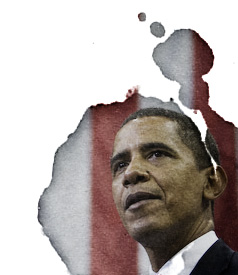Two days after his meeting with President Barack Obama and one day after his front man, Tony Hayward, performed dismally before Congress, Carl-Henric Svanberg, the chairman of BP, removed Hayward as head of BP’s efforts in the Gulf. A public demotion, within a powerful multinational like BP, is an unmistakable sign of disfavor – and an unmistakable sign as well of effective leadership by its chairman. Holding your team members responsible – and, thus, implicitly accepting your own responsibility for putting them in charge – is the essence of effective leadership.
Sixty days into the Gulf ecosystem catastrophe, Obama has not only failed to exert leadership over the “cleanup” process; he has failed to fire a single prominent person in his administration (Elizabeth Birnbaum, director of the obscure Minerals Management Service, being the exception that proves the rule). It’s as if lax regulatory oversight that enabled BP’s incompetence had occurred in a vacuum.
Allow us to be blunt: By not taking timely and decisive action, Obama has failed a critical test of leadership.
When we listen to Obama speak on critical issues, whether it’s the BP disaster or the festering war in Afghanistan, we sense a man standing above the issue, with feckless detachment. We hear a man who conflates action-oriented words and phrases (e.g., “we will not stand by while” such and such happens) with the game-changing actions taken by effective leaders.
Obama, of course, can give a rousing speech. But, lately, even here Obama has come up short. Last week’s speech on the BP oil catastrophe was curiously flat, its national energy policy little more than warmed over Jimmy Carter, except Carter knew of what he spoke.
Here’s what a confident, decisive leader might have announced: “Today I have accepted the resignation of Ken Salazar as interior secretary; I have charged the new secretary to clean house at the Department of the Interior and to replace all, and I mean all, of the political hacks hired by the Bush administration – and by my administration as well.”
A bold message, but an unmistakable demonstration of presidential firmness that would have highlighted the incestuous relations that existed (and still persist) between the federal government and private corporate interests, relations which in this case aided BP in winning last minute approvals for this disastrous project.
Obama and Salazar knew that George W. Bush had fed hundreds of corporate clones into federal regulatory agencies; thus, the first order of business in 2009 for any Obama appointee should have been to clean house. Instead, Salazar left most of the clones in place, allowing them to continue to serve the interests of big oil instead of the country.
Such milquetoast continuity has marked much of the first 18 months of the Obama administration. Consider Afghanistan. Obama has escalated the war while having no considered strategy for ending it on favorable terms. He’s loosened the reins even further on US special operations forces; he’s abrogated none of the extra judicial executive powers and privileges arrogated by Bush and Cheney; and he’s continued to fight for higher spending for the military-industrial complex even as he’s called for fiscal belt-tightening across the federal government.
Where Obama has succeeded, strangely enough, is in squelching tough-minded opposition to his policies. Like John Kennedy during the early years of Vietnam, a well spoken, intelligent, and liberal-appearing president with a comely wife has charmed, and mostly silenced, opposition critiques. Meanwhile, the often questionable, at times unconstitutional, conduct of the Bush era goes unchallenged, unchanged and undeterred.
Effective leaders make positive things happen. They don’t promise to bring change only to bring more of the same. Whether it’s in the Gulf with BP or in Afghanistan, Obama has hesitated, meditated – and failed to deliver.
If the president truly seeks change, he should know that his rhetoric of battle plans and deadlines won’t deliver it. If not from BP’s chairman today, Obama should take a lesson from the British of the 18th century, about whom it was said: “The Royal Navy believes it pays to shoot an admiral from time to time to encourage the others.”
More than words are needed. Heads must roll, Mr. President. True change requires it. So, too, does true leadership.
We have 10 days to raise $50,000 — we’re counting on your support!
For those who care about justice, liberation and even the very survival of our species, we must remember our power to take action.
We won’t pretend it’s the only thing you can or should do, but one small step is to pitch in to support Truthout — as one of the last remaining truly independent, nonprofit, reader-funded news platforms, your gift will help keep the facts flowing freely.
